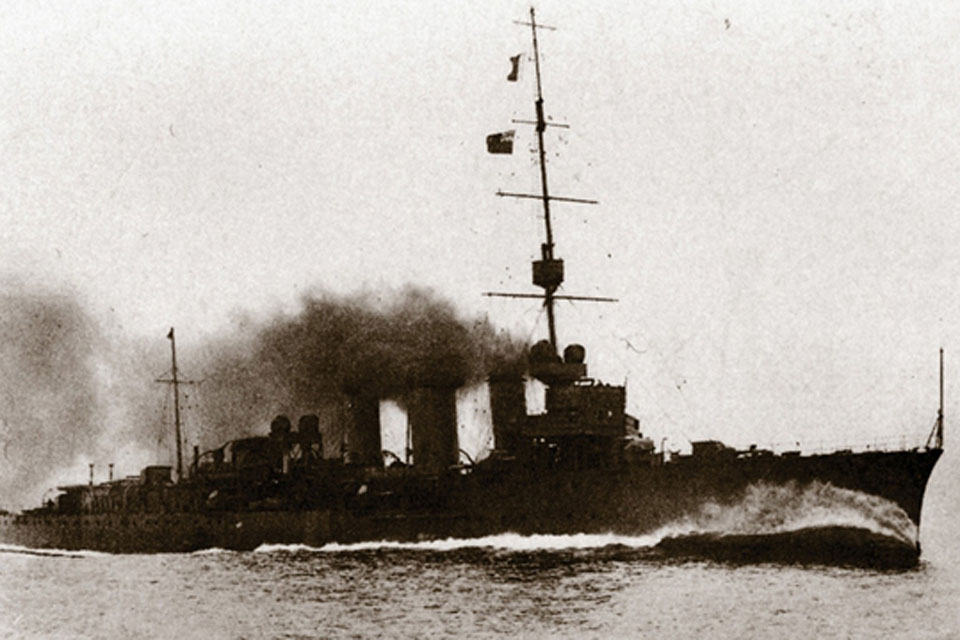First Sea Lord’s remarks ahead of the centenary of the Battle of Jutland
Speech by First Sea Lord Admiral Sir Philip Jones.

In all the reams of Jutland related reading material that have passed across my desk in the last few days, one fact that caught my eye was that no fewer than 8 future First Sea Lords were serving with the Grand Fleet during the Battle of Jutland.
For you, that’s an interesting historical fact. But for me, just 2 months into my own tenure at First Sea Lord, it adds to the poignancy of this centenary, as I consider my responsibilities, both to the nation and to our sailors and marines today.
Undoubtedly the most striking characteristic of the Battle of Jutland is the sheer scale of loss.
Admirals and Ordinary Seaman perished alike.
Never before had either navy lost so men on a single day.
When the battle cruiser Invincible was torn apart by an explosion she took less than 90 seconds to sink, taking over 1000 men with her.
Losses on this scale are difficult to comprehend. Nothing in our modern experience compares.
So it is important that in this centenary year, the focus be on remembrance.
But museums are designed to start conversations and encourage questions; and this exhibition is an important opportunity to reflect on the wider significance of Jutland.
Wider significance
Terrible as the losses were, the stakes in 1916 could not have been higher.
Without command of the seas, Britain’s maritime trade, the lifeblood of the war effort, would be in danger and Britain herself would be left open to the risk of starvation or even invasion.
Admiral Jellicoe understood the enormity of his responsibility.
He knew that the superiority of the Royal Navy’s Grand Fleet had to be protected at all costs.
And this was the strongest adversary that Britain had faced in a century. The long, calm lee of Trafalgar, as Andrew Gordon so poignantly captured it, was very much over.
Certainly the sudden and spectacular loss of several capital ships, with almost all hands, was disastrous.
There were serious questions about the performance of gunnery, signals, armour and shells.
And there was a profound debate over the balance between regulation and initiative in the culture of the Royal Navy.
As many of you know, historians, academics and naval officers still exchange broadsides on these issues today.
Perhaps, with the benefit of what we would today call better situational awareness, Jellicoe could have inflicted a crushing defeat worthy of Trafalgar.
But in repelling, rather than sinking, the German High Seas Fleet, he had done enough.
As painful and surprising as Britain’s losses had been, in truth, they did little to dent the Royal Navy’s superiority.
The very next day the Grand Fleet was back at sea and ready to do battle again, and within in a month the losses in ships had been made good.
The High Seas Fleet had failed to break the superiority of the Royal Navy and command of the sea remained with Britain.
Royal Navy today
Much has changed in a century.
But the fundamentals remain the same:
Britain is still an island nation and a global maritime trading power.
We are still dependent on the sea for security and prosperity and the nation still looks to the Royal Navy to protect its interests at home and around the world.
Today, the Royal Navy offers a unique blend of soft and hard power. We work to prevent conflict and promote security.
But we face the same challenge that commanders faced a century ago.
How can a navy that operates almost exclusively in peacetime conditions maintain the attitudes and skills required to fight a credible adversary in war?
This matters because, despite the best efforts of policy makers and academics, global security challenges are defined by their stubborn unpredictability.
The need to deter is ongoing, and when deterrence fails, we must be ready to fight and win.
So a fighting ethos must permeate everything we do: from the development of our doctrine and the design of our equipment, to how we train and our men and women and how we develop our leaders.
Because, as Jutland teaches us, major conflicts may be infrequent, but when they come along the price of getting these things wrong is unacceptably high.
Conclusion
Over the next week, this centenary will be marked in Scapa Flow, in the Firth of Forth, in our dockyard towns and at sea off the coast of Denmark.
But it also right that that the Battle of Jutland is remembered in London too, alongside so many other reminders of our island story here in the National Maritime Museum.
We will never forget those who fought and died in the North Sea a century ago.
But in a conflict otherwise remembered principally for the trenches of the Western Front, Jutland also serves as a necessary reminder of the enduring significance of sea power to our defence and to our prosperity.
Thank you.